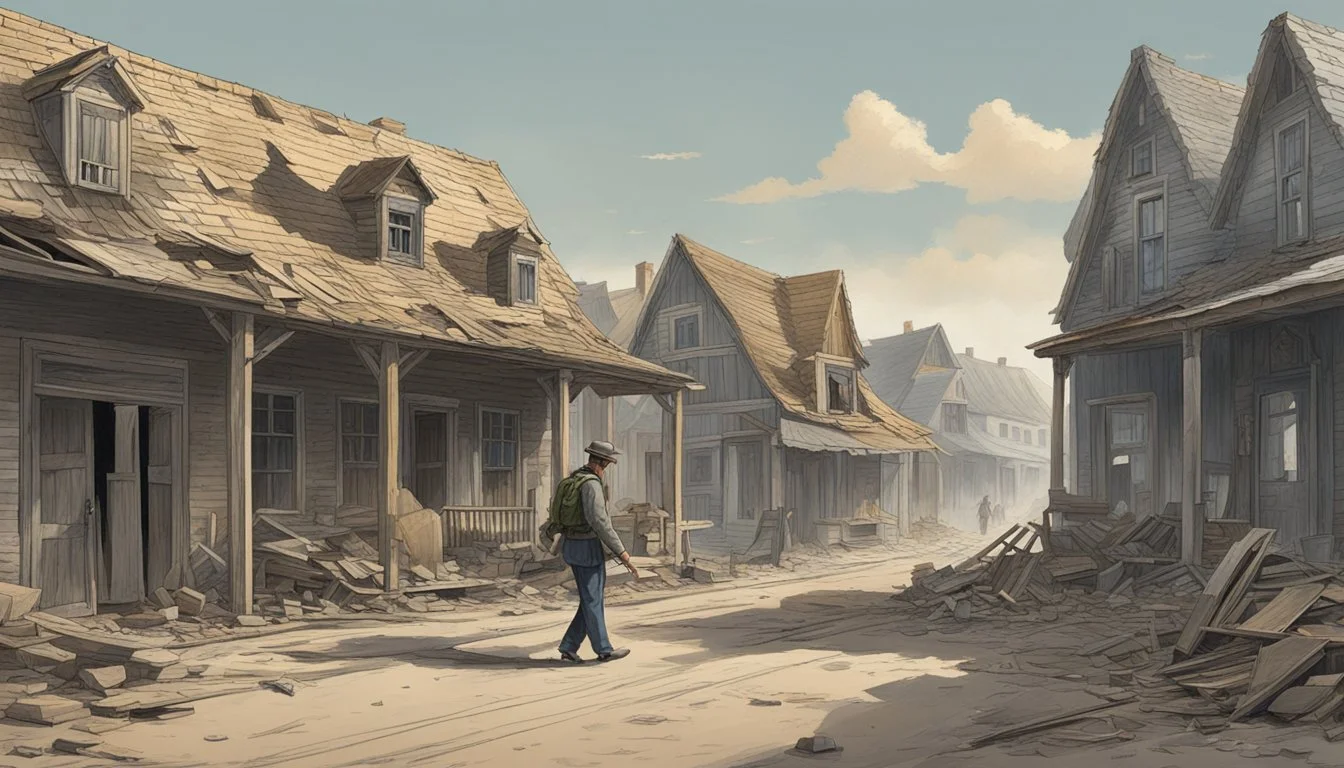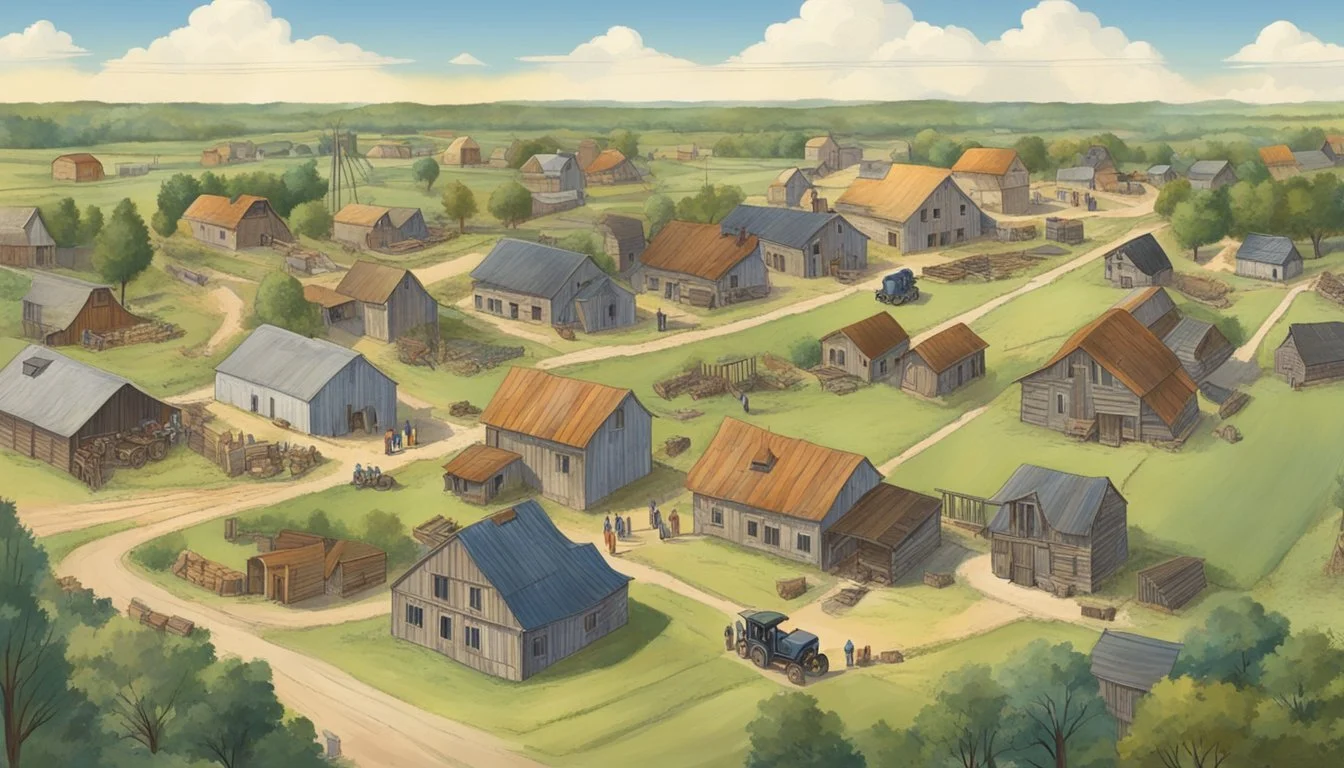The Impact of World War I and II on Texas German Communities
Cultural and Demographic Shifts
The two world wars had a profound impact on German communities in Texas, directly affecting cultural practices and societal perceptions. During World War I, anti-German sentiment swept across America, and Texas was no exception. The war created a divide between Texas’s large German population and their fellow citizens, leading to a decline in the use of the German language and the expression of German culture. Legislation, such as that passed by the Texas Legislature in 1919, prohibited the teaching of German in schools, which marked a significant shift in the state’s educational and cultural landscape.
World War II further intensified this trend, as the pressure to assimilate into broader American society increased for German Texans. The effects of these global conflicts were not limited to cultural suppression; they also manifested in personal hardship and changes to community dynamics. German Texans found themselves in a delicate position, having to navigate the patriotic fervor of the times while trying to preserve their heritage.
Throughout these challenging periods, the German-Texan community experienced dramatic change. The history of these communities during the world wars serves as a clear illustration of the complex interplay between national identity and ethnic heritage, showing how international events can reshape local histories and cultural identities.
Historical Background of Texas German Communities
The German legacy in Texas is a tapestry of cultural influence, economic impact, and historical significance, woven through the state's fabric from its early days as a republic to its integration within the United States.
Early German Immigration to Texas
The earliest significant wave of German immigration to Texas began in the 1830s. Notable figures like Johann Friedrich Ernst received land grants, leading to the establishment of settlements such as Industry, the first permanent German settlement in Texas. The Adelsverein, an association formed to promote German colonization in Texas, played a pivotal role in this process, orchestrating the settlement of thousands of German immigrants. Prince Carl of Solms-Braunfels and John O. Meusebach led the establishment of towns like New Braunfels in 1845 and Fredericksburg in 1846, laying the foundations of vibrant communities in the heart of Texas Hill Country, an area often referred to as the "German Belt".
Development of German Culture and Identity
German Texans maintained a robust connection to their heritage through language, culture, and traditions. The unique dialect of Texas German evolved as a linguistic symbol of identity. Germans in Texas built towns with distinctive Fachwerk architecture, celebrated cultural festivals like Oktoberfest and Wurstfest, and retained elements of their cuisine, such as sausages and schnitzel. The integration of music, dance, decor, and furniture from their native homeland contributed to the cultural mosaic of Texas.
Socioeconomic Contributions and Settlers' Skills
Germans brought a wealth of skills and occupations to Texas, fostering the development of diverse industries. Master carpenters, craftsmen, and farmers played essential roles in shaping both urban and rural areas. German settlers contributed significantly to agriculture, education, and the creation of businesses, enriching the socioeconomic landscape of Central Texas. The town of Boerne, established by German settlers, and Castroville, noted for its Alsatian founders but influenced by German culture, became examples of industrious and prosperous communities.
Interactions with Other Communities
German Texans interacted with various ethnic groups, including Hispanics, contributing to a unique cultural exchange in the state. German heritage in towns such as Fredericksburg and New Braunfels became interwoven with the broader tapestry of Texas history. Despite facing challenges during the World Wars, including legislation passed in 1918 limiting the use of the German language, the community's influence persisted. Over time, German culture and identity in Texas adapted, reflecting a blend of traditions while preserving its distinct German roots.
Impact of World War I on Texas Germans
During World War I, Texas Germans experienced a shift in their social dynamics as anti-German sentiment swept through the state, affecting their cultural practices, language use, and economic contributions to both the local and military spheres.
Anti-German Sentiment and Social Changes
Anti-German sentiment in Texas escalated rapidly with the United States' entry into World War I. Incidents of violence against German Texans were reported, including beatings and even murder. Public acts of patriotism were demanded of all citizens, and failure to comply, such as refusing to buy Liberty Bonds, could arouse suspicion and lead to harassment.
Preservation of German Texan Identity
Despite the challenges, many German Texans worked to maintain their cultural heritage. They found ways to preserve their traditions and passed them down through generations. While some aspects of their identity were subdued in the public sphere during the war, at home, they kept their cultural and linguistic uniqueness alive.
Economic and Military Influence
The economy of Texas was influenced significantly by the war. Cities like Austin and Dallas saw changes in the local markets and industries. Military installations such as Fort Sam Houston and Fort Bliss played crucial roles, and many German Texans volunteered for service, hoping to demonstrate their patriotism and allegiance to the United States.
Cultural and Educational Adaptations
Legislation was passed, notably the 1919 House Bill 304, which prohibited the teaching of German in public schools, colleges, and universities. This led to a decline in German education and a rise in English usage, propelling a shift towards American culture. Institutions like the German Free School in Austin had to adapt, and many German Texans began to embrace American educational systems and elan.
Impact of World War II on Texas Germans
During World War II, the German community in Texas experienced significant changes, including shifts in cultural and linguistic practices, challenges to civil rights, and both contributions to and consequences of wartime activities.
Cultural and Linguistic Shifts
World War II intensified pressures on Texas Germans to assimilate into mainstream American culture, leading to a decline in the usage of the German language and customs. The war, coupled with the anti-German sentiment already present from World War I, considerably reduced public expressions of German heritage. Texas Germans began to speak English more frequently, often relegating German to the confines of their homes.
Internment and Civil Rights Issues
The onset of World War II brought heightened suspicion towards individuals of German descent. Internment camps in Crystal City, Kenedy, and Seagoville, Texas, were among the facilities used to detain those deemed a threat. While not all Germans in Texas faced internment, the presence of these camps was a stark reminder of the civil liberties at stake during the heated war years.
Military Service and Defense Contributions
Despite challenges to their identity and rights, many German Texans volunteered for the United States Armed Forces. They contributed to the defense effort and were stationed at military installations both within Texas and overseas. Some distinguished themselves, earning recognitions such as the Medal of Honor, thus reinforcing their American identity amidst a backdrop of suspicion.
Post-War Community Transformation
The aftermath of World War II catalyzed further change for Texas Germans. Urbanization and the development of the 20th century encouraged more integration into a broadly American identity. This period marked a significant transformation of Texas' German communities as they negotiated their cultural heritage and historical contributions to American history within a rapidly changing societal landscape.
Modern Legacy of Texas German Communities
The Texas German communities continue to contribute significantly to the cultural landscape of the state, preserving their rich heritage while facing modern challenges and undergoing revitalization efforts.
Cultural Preservation and Renewal
Texas German communities take pride in safeguarding their cultural heritage. Festivals and events celebrate traditional German music, dancing, and food. The town of Fredericksburg, for instance, retains its German charm through its architecture and annual events like Oktoberfest, which draws visitors with its authentic Bavarian experience. In urban areas, local theaters occasionally stage German plays, maintaining the community's ties with its history. Language preservation efforts also remain a crucial part of cultural renewal, with initiatives to sustain the unique dialect known as Texas German.
Integration and Influence on Broader Texas Society
German influence is deeply intertwined with the broader cultural identity of Texas. Many Texas German towns have become integral to the state’s cultural tourism, offering a glimpse of historic German-Texan life. German Texans have contributed to the state's development, affecting a variety of spheres including culinary traditions, with Texas barbecue featuring German roots in its sausages. The melding of German heritage with Texan culture is evident in the seamless integration of German-inspired breweries and biergartens into the Texan social scene.
Challenges and Revitalization Efforts
Despite their rich cultural legacy, Texas German communities face challenges such as a dwindling number of Texas German speakers due to past suppression and generational shifts. However, revitalization efforts are underway. Grassroots movements and academic institutions strive to reinvigorate interest in the language, while modern communications and highways make Texas's German towns more accessible, facilitating the exchange of culture and traditions. Community-driven endeavors are ensuring that German heritage and identity remain vibrant elements of Texas's diverse cultural mosaic.
Impact on Contemporary Texan Society
The legacy of World Wars I and II can be seen today in Texas' vibrant German-American communities through their cultural expressions, acknowledgement of history, and ongoing contributions to the state's socioeconomic fabric.
Cultural Festivities and Tourism
Texas annually celebrates its German heritage with festivals like Oktoberfest and Wurstfest, drawing tourists from all over to partake in these culturally enriched events. Cities such as Fredericksburg, New Braunfels, and San Antonio transform into hubs of festivity, showcasing German cultural traditions through food, music, and dance. Historic venues like Scholz Garten and Saengerrunde Hall continue to serve as communal gathering spaces, fostering a connection to German roots for residents and visitors alike.
Historical Recognition and Educational Initiatives
In efforts to preserve German Texan history, the University of Texas at Austin and other educational institutions have implemented various educational initiatives. These programs encourage the study and recognition of the significant changes and contributions German settlers have made to the state. Through dedicated history curricula and public exhibits, Texas acknowledges the trials and transitions faced by German communities during the World Wars, further enriching the state's diverse cultural heritage.
Initiative Description Curriculum Integration Incorporating German Texan history into K-12 and higher education syllabi. Public Exhibits Showcasing artifacts and stories at museums and cultural centers.
Economic and Social Contributions
German settlers brought a variety of skills and culture to Texas, which have evolved into significant economic and social contributions. In urban areas such as Austin, Dallas, and San Antonio, German Texans have made their mark in various industries, from brewing and farming to advanced manufacturing. These communities continuously contribute to the economy, fostering growth and diversification, that reflects the industrious spirit of their ancestors.




